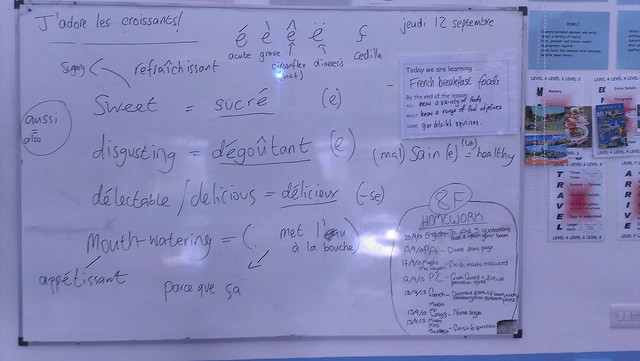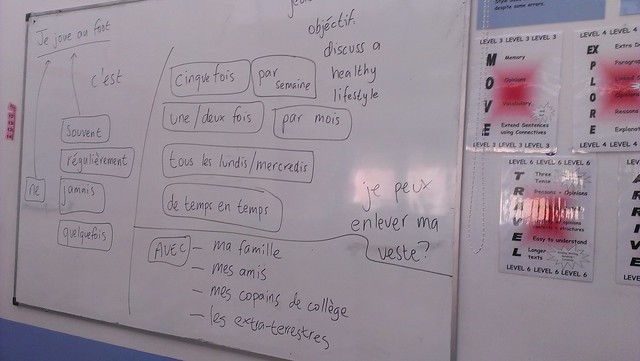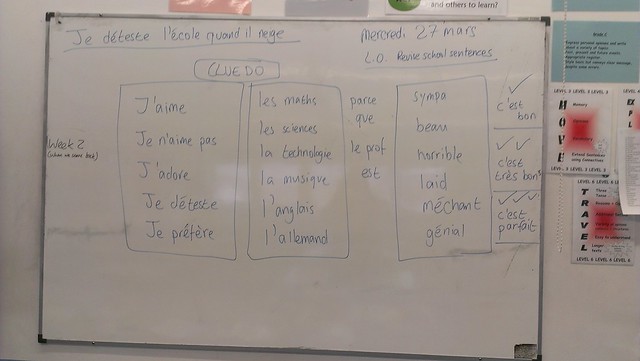A plea came through on the MFL Resources mailing list this week for ideas to use for languages teaching in classes with weak literacy skills, for whom sentences are a challenge.
This year, one of my performance management objectives is about improving my teaching across the ability range, so I have been collecting ideas, and I bashed out the following list of things to consider.
Firstly, there is a lot of overlap between KS3 students with weak literacy and the sorts of things primary language teachers do in KS2, so read up on primary languages. I can’t recommend Clare Seccombe highly enough – nearly every week she blogs something useful I can use in my secondary classroom.
Somebody’s blog recently had calligrams made up from parts of the body, so you draw a man out of words, and his feet say “pied pied pied” and his legs “jambe jambe jambe” and so on. Clare wrote about this too
Presenting paradigms of verbs as flowers or spiders – I had a practice on my whiteboard recently, and students liked this.
Half of the battle of teaching verbs in full paradigm is getting students to understand what you are doing, so I start this with personal pronouns in English, with a set of hand gestures (I, you, he, she with a single hand for singular, we you they with both arms for plural) and then an example of a full paradigm English verb, before finally moving on to target language pronouns and verb patterns. Even this is challenging with a room full of students who refuse to accept that “you woz” is not a correct use of English. (Even that I can understand – if everyone you know except teachers says “you woz” why shouldn’t you?)
Washing lines. If you work in a school where the facilities management people are not paranoid about things blowing the breeze and triggering burglar alarms, you can string lines across your classroom and get students to create things to hang from it. This can be bunting, posters, shapes of animals, with target language words on. If you are teaching clothes, it can be a washing line; a few weeks from now we will be celebrating April Fool’s Day which in France means poissons d’avril. They could be attached to a washing / fishing line instead of following children around the school and cluttering up every other classroom. (see also: paper aeroplanes)
Simple magic tricks go down very well with younger classes.
Cootie-catchers / fortune tellers / origami. Fortune tellers get them to practice spelling some simple colours and counting in the TL over and over again. Here are some links with resources and ideas: Dom’s MFL Page and TES.
Wordsearches are sometimes banned in some departments as the students almost always need to be working at a higher level than on individual words. And yet they have their place, especially at the start of the topic, and for getting students to focus carefully on every letter as a task to improve spelling. A nice twist on wordsearches is to make bespoke ones for individual classes and you hide the names of all the students in it as well as the TL words you want them to practice. This is easily done with electronic lists of students names and online serdworch generators. In my files I make sure I keep a list of the words I wanted them to search for and then to change the file from class to class I can add in the students’ names. To get from word level to sentence level, I have in the past got them to search for words in different categories (opinions, connectives, etc) and got them to use the words they find to build sentences.
Minibooks are something we spent a little time on in PGCE year and I have found there is a huge variety of different templates you can create reasonably easily. I can’t praise Clare Seccombe’s minibooks enough – this term we have done “row of shops” minibooks with older students who promised me they were not in fact too old for that kind of thing and hexagon minibooks to practice time, and for school subjects – pictures one side, sentences on other. The row of shops mini-books are now on display and getting lots of jealous comments from the classes who didn’t get to do them.
Treasure or Trash sorting exercises work with all sorts of vocab – you give them a pile of cards of words and they have to get the ones that meet your criteria into one pile and discard the rest.
Triptico resources – find 10 and word magnets are the ones I use most, and they’re free to all. It’s a beautiful and flexible set of apps to use on a smartboard, but that will work with any projector / computer combo. (I don’t have a smartboard and I’m not sure I want one! I do appreciate a large whiteboard and would love to have more than one in my classroom.)
Tarsia jigsaws – a free app from – it’s a pair matching activity that was designed for maths but awesome for languages too. The app gets you to make your own, but you can find somepremade examples here. I tend to give them to students on sheets and they cut them out then make them into puzzles; the first few pairs to finish stick them down on a sheet of paper and use that to help other pairs to complete it. It’s helpful to have a version of the completed puzzle yourself or at least the list of pairs you came up with to use as help, to project as an optional scaffold for the weaker ones. You can make the matching pairs numbers in figures and TL words; words in TL and in English; or for an additional level of challenge, concepts that link (eg les gants / les mains. la voiture / le gaz d’échappement) OK, that last bit is moving away from weak literacy classes somewhat.
There’s an amazing “minimum preparation, maximum effectiveness” games in MFL document on the TES here. This did the rounds on our PGCE year, and I found it again this week. We were doing animals in a class this week, and we ended up with some time at the end so we played “animals heads down thumbs up” – a game I did not know how to play last year, but all classes I’ve tried it with seem to know how to do it already from primary school. For animals, four people had an A4 sheet with an animal name written on it, and the students had to say “Je crois que c’est le (poisson / chien / chat)” (which was on the board as a support) – The class really enjoyed the game. It could be done with any vocab items.
Several lovely ideas in the document above relate to chanting – eg days of week written on board, class chants through over and over, teacher rubs days off one at a time until class can chant days of week from memory. Whole class chanting as one student tries to find hidden object – quietly when student is far away, loudly when student is near. “Chef d’orchestre” – student goes out, class decides on able student whose job it is to change the word that is chanted. When that person changes the word, the people near them change too, until the whole class is chanting the new word. The student who went out has to guess who it is who is changing. You can give them a TL phrase for the guess, or you can just be happy the whole class is chanting French words…






